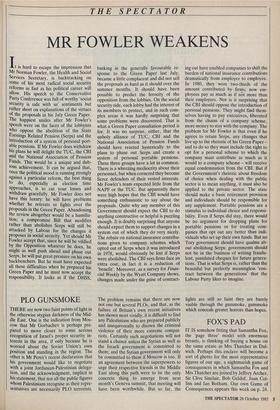THE SPECTATOR
MR FOWLER WEAKENS
It is hard to escape the impression that Mr Norman Fowler, the Health and Social Services Secretary, is backtracking on some of his most radical social security reforms as fast as his political career will allow. His speech to the Conservative Party Conference was full of worthy 'social security is safe with us' sentiments but rather short on explanations of the virtues of the proposals in his July Green Paper. The happiest smiles after Mr Fowler's speech were on the faces of the lobbyists Who oppose the abolition of the State Earnings Related Pension (Serps) and the introduction of a system of personal port- able pensions. If Mr Fowler does withdraw his plans he will delight the TUC, the CBI and the National Association of Pension Funds. This would be a unique and dub- tons achievement. It can be argued that, once the political mood is running strongly against a particular reform, the best thing to do, especially as election time approaches, is to cut your losses and withdraw gracefully. Mr Fowler does not have this luxury: he will have problems whether he retreats or fights over the proposals in the Green Paper. Abandoning the review altogether would be a humilia- tion; a compromise Bill that modifies rather than abolishes Serps will still be attacked by Labour for the changes it proposes in social security. Yet should Mr Fowler accept that, since he will be vilified by the Opposition whatever he does, he might as well push ahead and phase out Serps, he will put great pressure on his own backbenchers. But he must have expected all these difficulties when he prepared his Green Paper and he must now accept the responsibility. It looks as if the DHSS, basking in the generally favourable re- sponse to the Green Paper last July, became a little complacent and did not sell the proposals as hard as it should over the summer months. It should have been possible to predict the ferocity of the opposition from the lobbies. On the social security side, each lobby had the interest of its members to protect, and in such com- plex areas it was hardly surprising that some problems were discovered. That is what a Green Paper consultation period is for. It was no surprise, either, that the unholy alliance of TUC, CBI and the National Association of Pension Funds should have reacted hysterically to the plans to phase out Serps and create a system of personal portable pensions. These three groups have a lot in common. There is a wheezing mediocrity about their personnel, but when cornered they become fierce defenders of their vested interests. Mr Fowler's team expected little from the NAPF or the TUC. But apparently there were high hopes that the CBI would have something enthusiastic to say about the proposals. Quite why any member of this Government should expect the CBI to do anything constructive or helpful is puzzling enough. It is doubly surprising that anyone should expect them to support changes in a system out of which they do very nicely. The rebate on national insurance contribu- tions given to company schemes which opted out of Serps when it was introduced in 1978, would obviously be lost if Serps were abolished. The CBI says firms face an extra cost; in fact it is a reduction of `benefit'. Moreover, as a .survey for Finan- cial Weekly by the Wyatt Company shows, changes made under the guise of contract- ing out have enabled companies to shift the burden of national insurance contributions dramatically from employer to employee. In 1980, they were two-thirds of the amount contributed by firms; now em- ployees pay as much as if not more than their employers. Nor is it surprising that the CBI should oppose the introduction of personal pensions. They might find them- selves having to pay executives, liberated from the chains of a company scheme, more money to stay with the company. The problem for Mr Fowler is that even if he agrees to retain Serps, any changes that live up to the rhetoric of his Green Paper and to do so they must include the right to opt for a personal scheme to which the company must contribute as much as it would to a company scheme — will receive equal condemnation from the CBI. But if the Government's rhetoric about freedom of choice when dealing with the public sector is to mean anything, it must also be applied to the private sector. The state should make a basic retirement provision and individuals should be responsible for any supplement. Portable pensions are a stimulus to individual choice and responsi- bility. Even if Serps did stay, there would be no argument for dropping plans for portable pensions or for treating com- panies that opt out any better than indi- viduals who set up their own funds. But no Tory government should have qualms ab- out abolishing Serps: governments should not be in the business of writing fraudu- lent, postdated cheques for future genera- tions. That is what Serps is, rather than the beautiful but perfectly meaningless 'con- tract between the generations' that the Labour Party likes to imagine.


























































 Previous page
Previous page